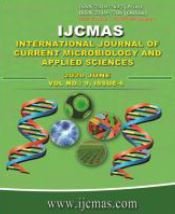


 National Academy of Agricultural Sciences (NAAS)
National Academy of Agricultural Sciences (NAAS)

|
PRINT ISSN : 2319-7692
Online ISSN : 2319-7706 Issues : 12 per year Publisher : Excellent Publishers Email : editorijcmas@gmail.com / submit@ijcmas.com Editor-in-chief: Dr.M.Prakash Index Copernicus ICV 2018: 95.39 NAAS RATING 2020: 5.38 |
The use of plastics and their products have completely changed the human society. They are enormously used in medicines, food, cosmetics, transportation, etc. Plastics are complex polymers which take hundreds and thousands of years to degrade remaining in the environment and disturbing the ecosystem which are a part of it. LDPE is one of the thermoplastic polymers abundantly used for commercial purposes accounting for about 60% of the total plastic production. Under normal environmental conditions, such polymers might take millions of years to degrade completely. But with the use of effective microorganisms, the potential degradation of the polymer such as LDPE can be done efficiently under optimum lab conditions. The aim of this study was to isolate fungi from plastic polluted sites of Patna and to study their ability to degrade LDPE with reference to SEM analysis. The fungi were identified by studying their macroscopic and microscopic characteristics. Penicillium sp. was selected on the basis of the positive screening and was further used to study the degradation of LDPE sheets during a course of 15 and 30 days separately. Finally, after the end of the incubation period the percentage weight reduction of the LDPE sheets were calculated and weight reduction up to 20% and 50% after 15 and 30 days of incubation respectively was observed. Also, the shift in the pH of the MSM broth from neutral to acidic was seen. Finally, the degradation of LDPE sheets was confirmed by performing the SEM analysis which showed porosity and fragility on the surface of the sheets.
 |
 |
 |
 |
 |